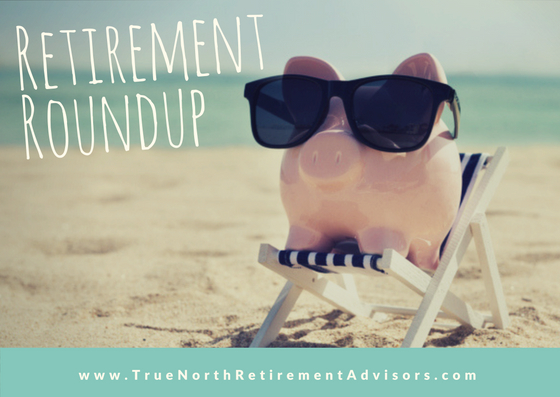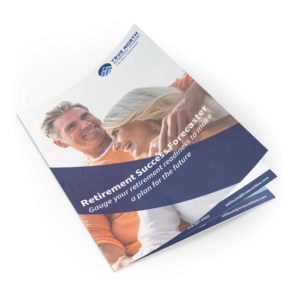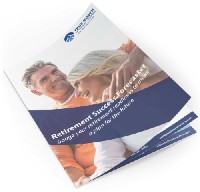Articles and ideas to help you live a fulfilled life!
In this month’s Retirement Roundup, we’ve curated our favorite articles from around the web to help you plan for and live successfully in retirement!
We start off with a how Oprah turned sound investment advice from Warren Buffett into a $400 million investment gain in just under 3 years! Nice work, Oprah.
We follow that up with an article about why so many successful people fear being broke (hint: it’s an irrational tendency to emphasize the negative and disregard the positive in our lives). There is hope though, as the author provides an easy way that you can start being more mindful of this tendency in your own life, and catch yourself when you go down the doom and gloom path.
Then, we switch gears to the Alternative Minimum Tax (or AMT). Even after the Tax Cuts and Jobs Act, this tax may still hit taxpayers, especially successful small business owners, depending on your income and other factors.
Next, we discuss the best day of the week to take a day off (backed by research) and the benefits of a “micro-vacation”, a.k.a. a day off. It is summer after all, and you don’t necessarily need to take a 3-week whirlwind trip to Europe to benefit from the re-charge that a vacation provides.
Lastly, we send you off into your weekend with the driving factor behind the decision we made about the structure of our firm, and why that matters for you.
Enjoy this month’s installment of the Retirement Roundup!
Oprah Took Warren Buffett’s Investing Advice … and Made $427 Million (Inc.)
One of the pillars of good investing is understanding a business before you invest. It may seem obvious, but many people let trends, market movements, and other non-fundamental criteria influence their investment decisions.
But really grasping a business and understanding its inner workings is a big contributor to Warren Buffett’s massively successful investment track record. Buffet has invested in Gillette razors, Coca-Cola, and other easy-to-understand businesses. This discipline to stick with what he knows (not what’s trendy) has been critical to his success.
Oprah Winfrey took that advice to heart in 2015, when she bought Weight Watchers stock for $7/share after trying the program herself. Oprah backed up the truck by investing $43 million in the stock and joined the Board. When the stock hit $100/share earlier this month, Oprah’s stake was worth nearly 10x her original investment.
She made nearly $400 million on her investment in just under 3 years! Nice work, Oprah.
The point here is that it’s critical to understand a business before you invest in it (or hire someone who understands it, like us ????).
Why Do So Many Successful People Fear Being Broke? (Rad)
Quite often, I hear clients voice their deep fears about being a Wal-Mart greeter or having to move into a cardboard box when they’re 90 because they’ve lost it all. According to this blog post, many of us have these thoughts and an “irrational tendency to immediately project forward to an unpleasant future”.
When I was in high school this was my thought process every time I had a big test: Bad grade on this test = C in the class = poor GPA = not going to college = turning to a life of drugs = dead in a gutter at 25.
Pretty crazy where your mind can take you, right? But many of us have this irrational thought process, especially when it comes to our finances.
On the flipside, we tend to minimize the good. Did your investment portfolio go up 15% last year? Meh. Fast forward to the first quarter of this year, when the S&P 500 dropped 10% in 9 days and all of a sudden, we’re getting phone calls from clients who are convinced we are on the precipice of the next major market meltdown and it’s time to sell!
One practical piece of advice is to write down all of those upsetting happenings that seem like a really big deal in the moment – last week’s fender bender, the fight you had with your spouse, North Korean nuclear tests, the client you lost, the friend who gossiped about you, trade wars, your child not getting into their college of choice, or your mother’s hospital stay.
You’ll likely look back on these events in a few months or a year and realize that they worked themselves out and the outcome was fine, or there was even some unexpected positive twist from the situation. It really wasn’t the crisis that it seemed to be at the time.
So, the next time you feel your blood pressure rising or your stress level skyrocketing, try jotting down what’s got you so tied up in knots, and then look back in a few months on your stressor. Did it turn into a real crisis or did you nearly forget about the situation entirely?
Investors Beware: Alternative Minimum Tax Can Still Hit Some Taxpayers Despite Reform (CNBC)
Good ol’ AMT. Still not going away! Tax experts advise that the Alternative Minimum Tax (or AMT for short) may still apply in certain situations, especially for taxpayers with “mid-six-figure incomes, lots of kids, itemized deductions and long-term capital gains, and holdings like incentive stock options and private-placement bonds”.
After the Tax Cuts and Jobs Act passed, it’s expected that fewer people will now pay AMT – an estimated 600,000 taxpayers this year compared to 10.3 million taxpayers in 2015. That’s quite a reduction in the number of people expected to pay AMT, yet many successful small business owners may still find themselves paying AMT.
Doing some mid-year planning with your tax advisor can help you determine what strategies might be available to help you reduce your AMT tax bill. “Many longstanding strategies for avoiding or minimizing AMT by reducing taxable income will still work and can be especially valuable to business owners who can postpone income and take deductions and book expenses sooner.”
The good news if you’re still subject to AMT: the maximum AMT rate dropped from 39.6 percent to 28 percent.
How to Get the Most Out of a Day Off (Harvard Business Review)
My son’s baby book seemingly whispers to me every time I walk by: “You’re a bad mother”. He was born 10 months ago, and I’ve been keeping notes on my phone about his first teeth, his first foods, and his first steps (happened this week!), but I can never seem to find the time to record these important first moments in his beautiful baby book. So, the book just sits there in my home office, at the top of my mental to-do list, calling to me, nagging me with those blue stripes and sailboats on the cover.
What does this have to do with taking a day off? Well, this article discusses some practical tips to make the most of brief pauses from work. These days off (or “micro-vacations” as author, Elizabeth Grace Saunders calls them) don’t have to be 3-week tours of Italy. A vacation can be as simple as an afternoon off to complete that baby book that might be robbing you of your joy.
In fact, there are tremendous benefits to taking a micro-vacation: no planning, no school and work schedules to coordinate, lower cost, and no stress when you return to 2,452 unread emails.
In fact, many of us know the headaches and stress involved with extended travel, so we throw up our hands and instead, we don’t take any time off. The beauty of micro-vacations is that they “can happen more frequently throughout the year, which allows you to recharge before you’re feeling burnt out.”
The article offers 4 practical ways to incorporate more micro-vacations into your life. From a remote workday to decompress and focus (my personal favorite) to taking an afternoon to meet with a friend, these opportunities to recharge can be sprinkled more frequently throughout the year, offering a break without the time, expense, and hassle of an extended vacation.
For Maximum Recharge, Take a Wednesday Off (Quartzy)
Many of us end up taking a lot of Fridays off in the summer to head to the beach for the weekend, play golf, or weed the garden. While days off work are great for recharging, taking a Friday off may not be the best choice.
It turns out that a Wednesday off is better for breaking that rhythm of working hard for 4-5 days a week, and it’s actually much easier to stay motivated throughout the week when there is a break in the middle.
“You start the week knowing, I only have two days on this rhythm and then I get back to mine, ” Dawna Ballard says, describing the shift in perspective that comes from a Wednesday off. “There’s a greater sense of calm and control.”
Other than bringing more balance to our workweek, a Wednesday off has other nice perks – empty beaches, parks, restaurants, and movie theaters!
9 Out Of Top 10 CNBC “Fee-Only” Advisory Firms Not Actually Fee-Only? (Nerd’s Eye View)
Dave was speaking to a client the other day who finally understood what it meant for our firm to be a fee-only, fiduciary advisory firm. Then he exclaimed: “Why aren’t you telling more people about this?!” We thought it was a good point, and while some of you might know the story of what led to the choice we made when starting our own firm, most clients still don’t fully understand what “fee-only” and “fiduciary” mean and why it matters.
But this distinction was so important to us, that it led to the most basic business decision we had to make – the structure of our firm.
So, what does it mean to be a “fee-only” financial advisor? It means that as an advisor, you don’t accept commissions, kickbacks or other perks from selling certain products. The only compensation received is directly from the client.
This is an important (and rare!) distinction in the world of financial advice. When an advisor is truly fee-only, there is a fiduciary obligation to do what is in the best interest of the client and to put the client’s interests first. It’s much easier to do that as a fee-only advisor, since most of the potential conflicts of interest from selling products and earning commissions are stripped away.
In 2015, when CNBC released its second annual list of the “Top 100 Fee-Only Wealth Management Firms” it noted that consumers should “make sure you understand how that [advisor] gets paid, and that means [understanding] fees vs commissions” and that “fee-only financial planners… do not accept any commissions or other compensation based on product sales.”
But in a bit of an embarrassing blunder, even the list creators themselves didn’t understand their own criteria, since a deeper look at the ADV (disclosure document) for 9 out of the top 10 firms on their list revealed that these firms were not fee-only!
We point this out because the Registered Investment Advisor (RIA) business model that we chose was very intentional since it affords us the rare distinction of being truly fee-only and beholden to the interest of our clients ahead of our own, in all circumstances.
Thanks for reading this month’s Retirement Roundup!
Did you enjoy reading this? Do you want more content like this delivered to you each week?
Click here to subscribe to our newsletter >>
Not yet a client? Want to talk about how we can help you reach your retirement goals? Schedule a 15-minute call with us! It’s free – no pressure, no sales pitch.



